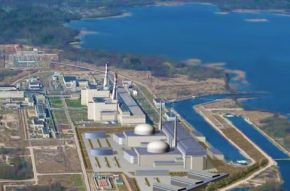Energy, EU – Baltic States, Legislation, Lithuania, Nuclear power plant
International Internet Magazine. Baltic States news & analytics
Friday, 26.04.2024, 23:43
Sweden's decisions highlight faults of Lithuanian energy strategy
 Print version
Print version |
|---|
"Lithuania should definitely learn a lesson from our progressive neighbors and respond to the conclusions, as Lithuania is currently in the process of revising its national energy strategy," Svedas, a lecturer at the Vilnius University's International Relations and Political Science Institute, told BNS on Wednesday. He is also former vice-minister of energy and foreign affairs.
In Svedas' opinion, the Swedish move to keep its nuclear plants running and cut taxes for them shows that the state is hearing the requests from the industry, therefore, a decision was made to ensure safe supplies of electricity. He said Sweden indicated its understanding of the tendencies of increasing power demand.
"Lithuania should draw a conclusion – my conclusion is that it is a very good example, we should look at the neighbors and see that the demand for electricity is rising, energy should serve industry, it should create GDP, it is low-carbon, renewable energy and nuclear energy can co-exist," said Svedas.
In his words, the new National Energy Strategy is focused on electricity imports, as the objective is to secure cheap power supplies. Svedas has criticized authors of the strategy for failing to see the future and the future tendency of higher prices.
Sweden's decision to extend the operations of nuclear power plants is due to possible future lack of electricity in the region. Therefore, Lithuania, in his words, should look at its plans and pay more attention to the Visaginas Nuclear Power Plant project.
"My conclusion is that we should look at the VAE Project in the context of the Swedish example and reconsider it. We know that everyone else already forgot the project, while Japan's Hitachi is still waiting. The consistency is surprising," said the expert.
According to the energy strategy guidelines, Lithuania would have to limit VAE output in 2040-2050, if it is constructed, in order to meet the European Commission (EC) requirements on production from renewable energy resources.
Svedas expressed conviction that VAE could be competitive, although very expensive.
"A strategy is something where you set an objective and then search for ways to achieve it. The problem with the nuclear plant is in its financing. Enormous funds are needed, however, there are various financing measures. (…) Today's financial models are different, however, if your goal is to be an exporter, you can become one. Let's remember the LNG terminal – the initial reaction was that it was expensive. When prices declined, the LNG terminal became in demand, the number of contracts is rising," said Svedas.
Some reviewers say the decision will keep prices in Sweden at a low level for some time at least, at the same time preventing electricity prices from rising in Lithuania, as well, as the country has the NordBalt power interconnection with Sweden. Dalius Misiunas, CEO of Lietuvos Energija (Lithuanian Energy), said on Tuesday this meant low electricity prices, triggering an idea of a new power link with Sweden.








 «The Baltic Course» Is Sold and Stays in Business!
«The Baltic Course» Is Sold and Stays in Business!

